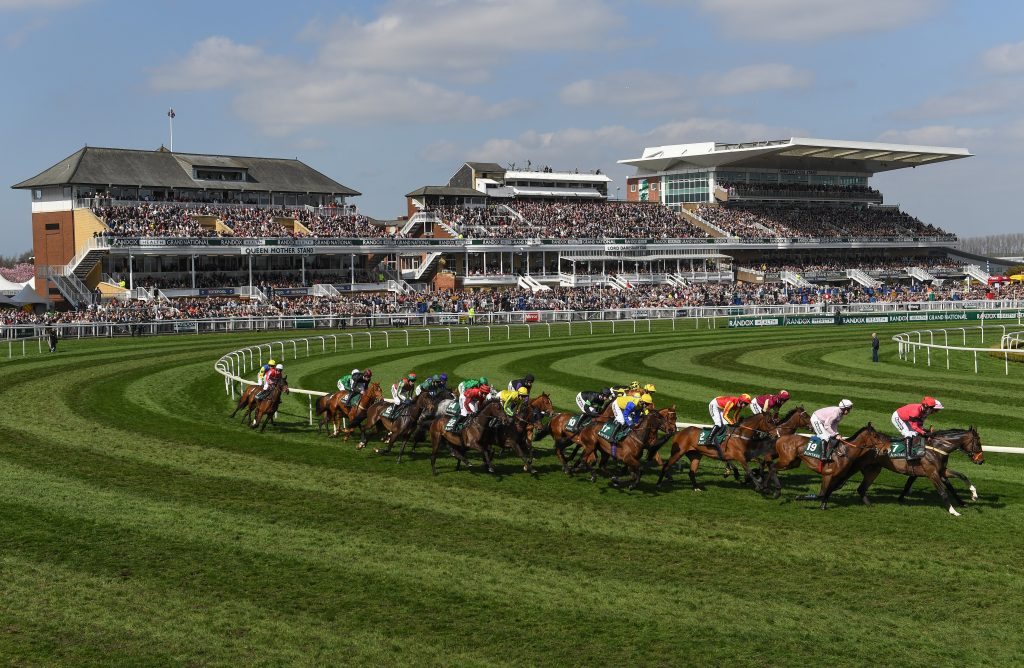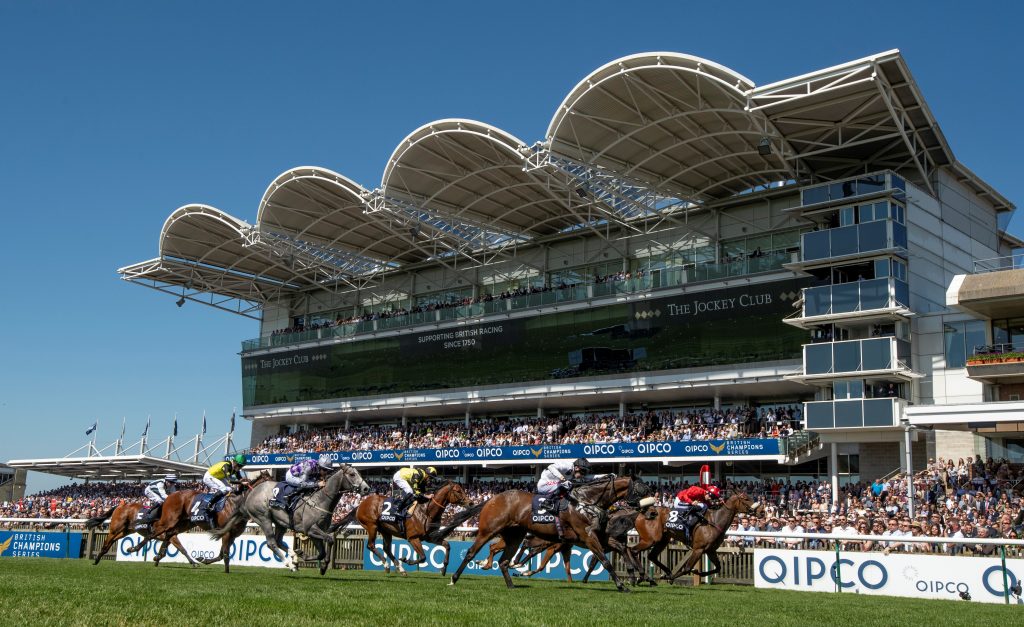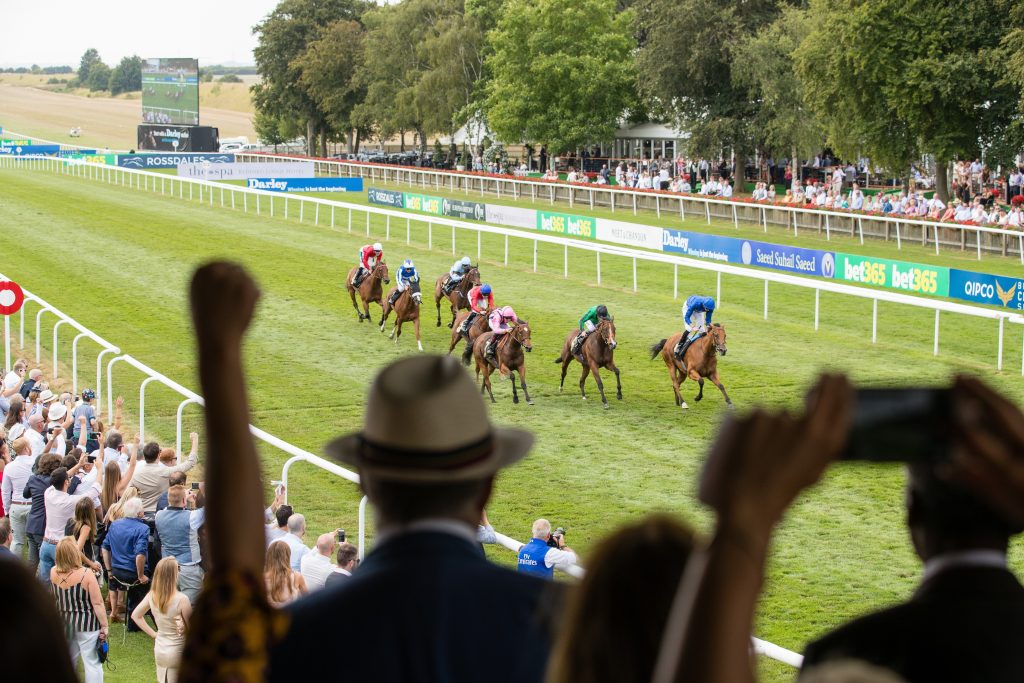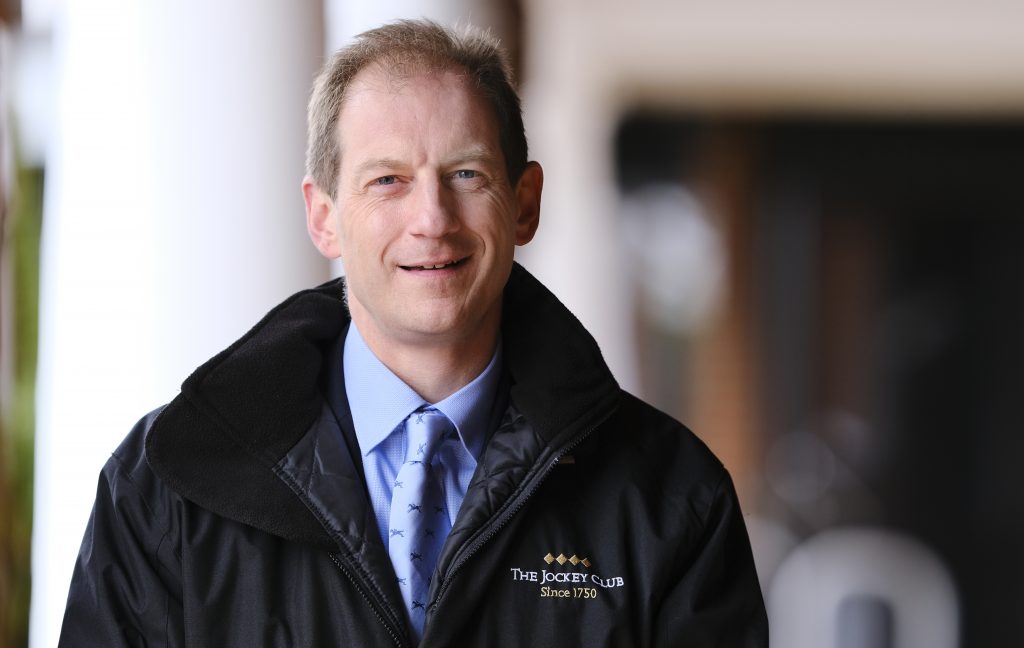Exclusive: “Covid’s A Big Test For Everyone, A Big Test Of Us As Leaders” – Nevin Truesdale, Jockey Club CEO
February 23, 2021
After seven years at the Jockey Club, most recently as Group Chief Finance Officer, Nevin Truesdale was appointed as the organisation’s new Chief Executive Officer at the beginning of 2021, following a five-month period in the role on an interim basis since August of 2020.
As with all sporting bodies at this time, Nevin’s task is to now navigate the Jockey Club through the difficult period enforced due to the Coronavirus pandemic, which initially caused the suspension of racing and removed spectators from the sport’s events for almost all of the past 12 months since the end of the Cheltenham Festival in March 2020.
In three weeks’ time Cheltenham will be upon us once again, springing back into life as the sport heads closer to the summer’s flat racing season when fans hope to be back in venues, but unfortunately meaning the Cheltenham Festival will be without around 60,000 daily fans in attendance roaring the horses home.
With sport slowly creeping back towards normality and the recent announcement of a number of key leadership changes within the organisation, iSPORTCONNECT’s Ben Page chatted to Nevin to hear more about how he intends to take the Jockey Club forward in a positive manner as it bounces back from Covid.
So Nevin, congratulations on the new role! How are you looking at your goals and plans for the organisation in what we cannot forget is obviously a very difficult time?
Thank you, yes it’s been tough in the last year obviously with every sports business in a similar boat in many ways. But we were very pleased that racing was the first sport back up and running in June and to be able to put racing on safely behind closed doors ever since has been great.
The immediate priority is that we’re still able to race and get some rewards going back through the system as a result of that, while steering the business and the industry through the financial impacts. They have been substantial and will continue to be, but we’ve done a lot of financial management to counter that.
“Covid’s a big test for everyone… If you get yourself to a position where people feel that you’ve been successful in navigating the business through this it buys you a lot of credibility”
Looking further ahead I’m very big on making sure the business space is somewhere people really want to come and work. It’s a fantastic business to be in, we put on some world class, world famous events and people who’ve worked with us feel really inspired and motivated by that. Therefore one of my really big goals is to engender that feeling of belonging and togetherness. That requires a leadership team that understands the concerns and needs of our people at the minute, and those in the industry, to ensure we’re listening and are empathetic to people’s feelings.
Covid’s a big test for everyone, a big test of us as leaders and a big test of the industry. If you get yourself to a position where people feel that you’ve been successful in navigating the business through this it buys you a lot of credibility and a lot of capital for the future.
Another focus is on data and digital content development, racing lends itself really well for that. So one of my big priorities is to take greater steps there, making sure we’re generating the digital content that really engages new fans and gives us a real platform to work from. ITV were doing a great job of growing our audiences from their inception in 2017, that grew once again during lockdown. So there is a there is a new fanbase out there watching racing on TV, certainly the top end stuff, and getting those people to come and experience a race day and all that it gives you, that enjoyment, is something that I really want us to be major on and show it’s fantastic place to come.

Then finally just continuing to strengthen industry links, the resumption of racing is a great example, the BHA [British Horseracing Authority], participants, racecourses. When everyone gets together and cooperates there’s little we can’t achieve and we’ve shown that consistently over the last few months. So bringing those industry stakeholder relationships together and making them work even better is another big one for me. While I know the industry, and I like to think I can provide fresh perspectives, having new people on the team will help us bring those new viewpoints to the table. But having those industry contacts and some of that standing definitely helps in terms of how you engender that spirit of cooperation. Yes, we’re a little bit limited in how much we can physically invest until we know exactly the impacts of COVID, but we have a very capable Finance Director and we’re dealing with that as well as we can.
You raise a point many have mentioned in the industry these last 12 months, how people from all sports have had to work closer together to benefit each other, is that one of biggest impacts would you say?
Well first of all if you said to me we’d still be in this position as long ago as April I could never have believed you, so it’s definitely been longer drawn out and therefore worse than many expected. But a little bit of foresight and planning from a lot of people in the industry has really helped us to cushion the impact of it. And that’s everything from how we plan the race programme, how we’ve evaluated if operating costs are too high, to how we’ve been able to utilise some of the government assistance that’s been an offer as well.
“I know you’ll see some lasting changes in how we approach our challenges and how we learn from other sports in that respect as well.”
That’s areas we’ve learned from each other, the RCA [Racecourse Association] have helped us, advising on things like the legalities of the government’s job retention scheme and how to take advantage of the business rates relief, that’s been crucial for us. So to me this cooperation is a real, positive legacy from COVID to show maybe we can do things a bit differently and we should be cooperating properly and seeing each other’s point of view.
It’s made us more open and not just racing, other sports too, looking at how we all work together. I know you’ll see some lasting changes in how we approach our challenges and how we learn from other sports in that respect as well.
How would you say racing has been able to fare over the past 12 months, what are your overriding thoughts as to how the sport has coped taking everything into consideration?
If you look at the longevity and the fact we’re still having to cope with it for a sustained period, we’re still standing, we’re still resilient. Yes, there are huge financial and operational challenges, but I think that in itself is testament to the fact we’ve done a pretty good job.
You always look back and think about things going ‘If we knew what we knew now…’ and funnily enough my wife asked me this last night, ‘If you’d known how long it would last this long what would you have done differently last year?’ And the reality is, nobody knew how long this was going to last, but we had to work on the basis that it could last for a while.
So the fact we’re still resilient and standing is a real positive and actually the industry will come out of it probably leaner and better in many ways. We’ve been able to get behind closed doors racing on safely for a sustained period without any real wobbles at all when it comes to increased infection rates whatsoever. The protocol was observed by everybody and really well implemented and advised by Dr. Jerry Hill and the BHA, so that’s been fantastic.
We might have liked to have seen a little bit more latitude maybe with spectators back in the autumn when the opportunity was there. But the government were right to say we’ve got a second spike coming, so we need to take that away from you. So when it’s right and safe to do so hopefully they can they can start to lift some of those restrictions quite soon.
It’s a great point you make there that while other sports had been cancelling events and fixtures well into the latter stages of 2020 and even the New Year, racing has been able to keep the sport going miraculously well?
If you actually go right back to when racing was suspended back in the in the spring, and see the flexibility shown by the BHA, the flat pattern committee and a lot of people in that racing community around the movement of some of the really big pattern races, I don’t think a single large group one pattern race was missed.

They may have raced out of slot but certainly a month after we restarted, we were back to normal on the rhythms and timeframes of that racing summer as early as the first weekend in July when we had the Derby and the Eclipse on same weekend. And I think that’s a feat to quite a lot of people actually.
You mentioned earlier there you have made some new recruits into the strategic and leadership team with a slight restructure. Alexandra Goldschmidt joins as Director of Partnerships, Charlie Boss as Chief Commercial Officer and Olaf Gueldner comes in as Chief Marketing Officer, while Hannah Grosvenor moves up to National Sales Director.
Why do you think this is important and what kind of positive message, maybe almost bullishness for the future, do you think that sends at the same time in how you can bounce back post-Covid?
I think it’s important when you’re being you take a step back like this, and this is relevant in human life in general, when you take a step back you can’t let it impact you for too long. You’re resilient enough to think ahead two or three moves on the chessboard, because if we were just purely on the defensive we wouldn’t be ready for what’s ahead.
Because what is ahead at some stage is a very busy sales period, as I said earlier, whenever that may be. So having banked use of your customer data, CRM strategies, commercial strategies in place to be able to take advantage of those opportunities when they come is critical, you can’t stand still.
“People who have been with us for a while and know the business well are invaluable, but also having people who are going to bring something completely fresh is a fantastic combination.”
By bringing in a fusion of some very new thinking and people who have not worked in the industry before, infusing that with what we’ve got internally, which is a great team with a fantastic experience. It’s great to have a mixture of the old and the new, people who have been with us for a while and know the business well are invaluable, but also having people who are going to bring something completely fresh is a fantastic combination.
With Olaf coming in and Alex coming in as Director of Partnerships it’s going to work fantastically in the business. Charlie’s going to be joining us later in the spring, he comes with a brilliant track record from previous roles. And then bringing through some really good internal talent like Hannah Grosvenor as well, you’ve got to keep things fresh and be ready for the next challenge. For us that challenge is not too far down the road.
Where do you think that that fits in in terms of the Jockey Club, does it need to modernise or potentially continue a modernisation process? Linking back to what you said at the beginning in terms of that digital side.
The business I came into and the one I have now are very, very different. Every business I’ve ever worked in is on a constant evolution, I’ve worked in PLCs, private equity businesses and I’ve worked in sport. It’s the same thing in that you’re never standing still. So I think it’s probably a little bit of a misnomer to say businesses like this need to modernise, because the fact is that we’re always evolving and changing.
If you look at the people we’re bringing in, not those I’ve just mentioned but others from recent times from Ireland, the FA, Red Bull, a whole host of different organisations, they all bring a new perspective and you’ve picked up rightly on one area where we’ve been on quite a journey in terms of our digital content generation and use of customer data.
“Cricket is a good example of a sport that is able to evolve and put itself into new formats to attract a new audience. A lot of sport now needs to bring itself to the fan, as opposed to the other way around.”
That’s an area where I think we can get even better still, but I will probably widen it out from to how we engage with sponsors, attract new brands into racing, how we continue to improve the on-course, customer experience, not just the racing but the overall day experience. My test is always, between a race can people go and get a burger, lay a bet, go to the loo… maybe not necessarily in that order! But fundamentally, how do people move around the site, a lot don’t underestimate the importance of that so let’s not ignore the modernising of our sites as well.
You talk about how you modernise and innovate, we know music, particularly live music, is a big part of our business over of summer, so getting back to that when things are normal.
At the minute we’re helping the national effort with vaccinations which we’re hugely proud of, not just at Epson but a number of racecourses, so we’re really pleased to be able to help out. So there’s a huge amount of different ways in which we can evolve and keep moving things forward and the new team we’ve got is very well placed to do that I think.
That leads perfectly onto my next question, we’re seeing new innovations such as City Racing and the Racing League beginning in the coming months. How do you think these creative new formats can benefit racing and potentially bring in new fans?
I think if you look across all sports the fan experience is fundamental now, we’re all competing for people’s attention. You see things like the Abu Dhabi T10 that’s just been on TV, I’m a big cricket fan and all those years ago I was initially a bit sceptical about T20, but now cricket is a good example of a sport that is able to evolve and put itself into new formats to attract a new audience.
A lot of sport now needs to bring itself to the fan, as opposed to the other way around, it’s really important that the sport makes itself accessible to fans and the fact a large majority of people are within a fairly short radius of a racecourse somewhere in the country is fantastic.
But equally, bringing it to city centres with the increasingly urbanised population we now have think is really important. Clearly there’s a lot of factors to think about, specifically can you do it safely? And that’s really important. But we’re very proud to be part of City Racing and I’m very keen to find a way to make it happen, we’ve got some exciting plans for when we’re allowed.

In answer to your question, I think it’s really important that we are attracting new fans, taking the sport to them. Team Racing as well we’re not directly involved in but it’s to be absolutely endorsed and a great example of how we innovate the product. These are things we’ve discussed a lot, even down to how we innovate the fixture list. Should there be even more big championship races a weekend. A very controversial subject for many, but there’s a lot of stuff there around how you package the race programme and journey to improve that.
It also goes way beyond racing, some of the diversification I’m quite keen to look at. Looking at things like hotels, how do we develop a site? There’s a number of possibilities in the pipeline that we’re looking at. We’ve also gone deeper into the national brand licencing, that’s nothing to do with racing at all, but it helps our overall business.
As you said it’s a massive year across all sports with so many events occurring, so what does the rest of 2021 look like for the Jockey Club and across the whole calendar?
Definitely making sure we really move forward on some of our commercial goals as and when we’re able to, but I think you’ve hit the nail on the head, a lot depends on what the calendar looks like. We have a full fixture calendar, however I think we’ll see the calendar being racing-wise materially different than normal.
The speed of return of spectators to racecourses will play a part, as will how quickly the government start to reopen betting shops, still a reasonably sized chunk of our business income streams. We’ll get spectators back in when we can but importantly when it’s safe to do so, it’s great that we’re able to help with the vaccination programme. It’s one step at a time, this will leave its mark and take a little while to bounce back from yet I still think there are going to be some real positives emerging on the other side.
So for the next few months it’s a question of keeping everyone in the industry and all our teams, who are doing a brilliant job, on the straight and narrow and planning for hopefully a very exciting second half of the year.


